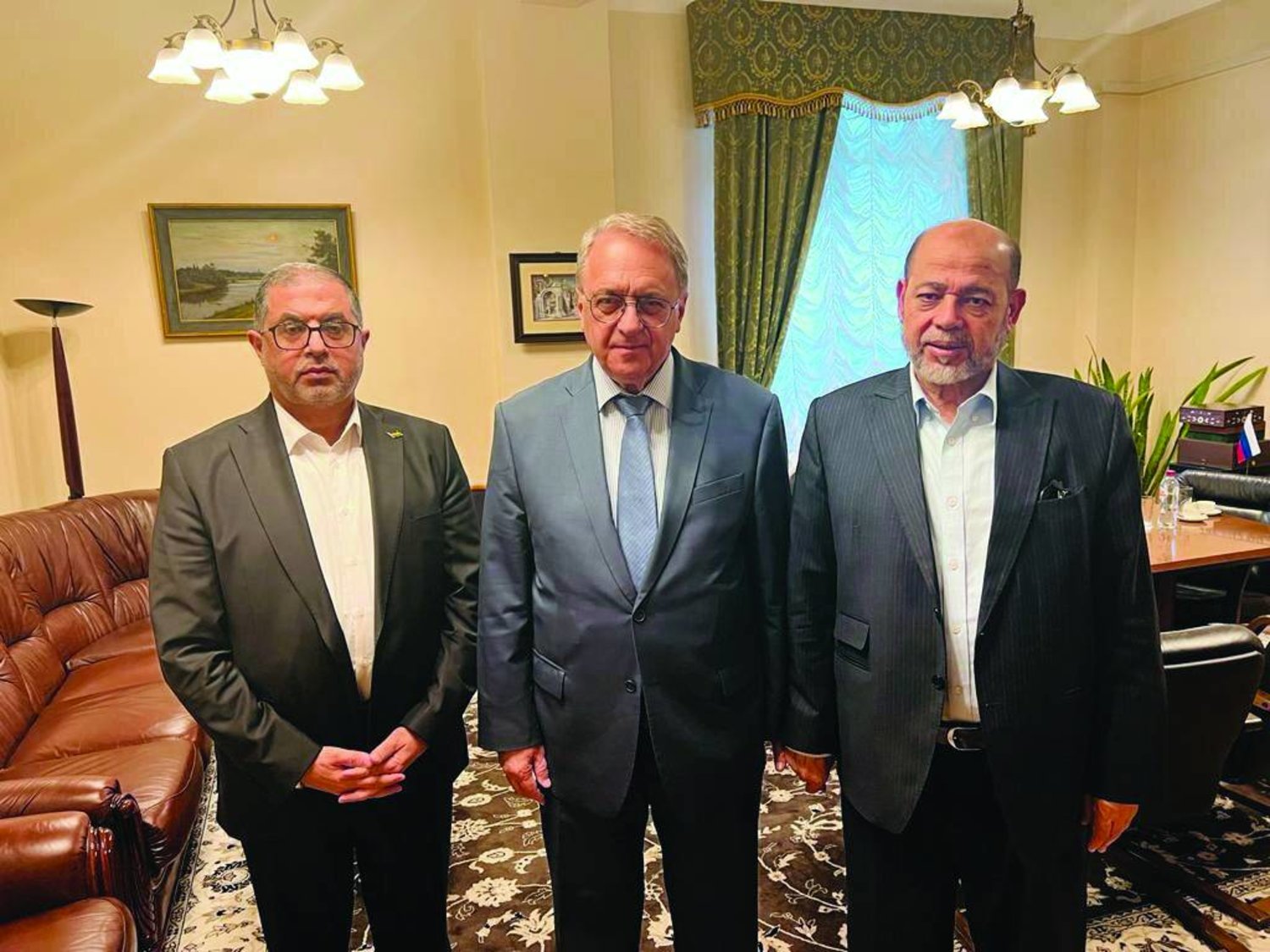The visit of a Hamas delegation, led by Musa Abu Marzouk, Deputy Head of the Political Bureau, to Moscow on October 26th for a two-day meeting and their discussions with Russian Deputy Foreign Minister Mikhail Bogdanov, who is also the Russian President’s Special Envoy to the Middle East and Africa, has generated strong criticism from Israel. This visit coincided with a Moscow visit by Iranian Deputy Foreign Minister Ali Bagheri Kani. It occurred three weeks after Hamas conducted “Operation Aqsa Tempest” on the 7th of the same month.
The Israeli Ministry of Foreign Affairs has condemned the visit, labeling it as “support for terrorism,” and has called for the delegation to be expelled from Moscow. In contrast, Russia has defended the visit, highlighting the importance of maintaining communication with all parties involved in the crisis to build strong relationships.
Key Determinants
Russia has adopted a stance that differs from most Western countries and the United States, which expressed their support for Israeli military operations in Gaza following the “Operation Aqsa Tempest.” The main determinants of Russia’s current position on the military escalation in Gaza are as follows:
- Exploiting the Escalation to Criticize Western Positions: After the armed attacks by Hamas on October 7th and the subsequent military escalation by Israel, the Kremlin primarily pointed fingers at Western countries, accusing them of neglecting conflicts in the Middle East in favor of supporting Ukraine. It urged the international community to refocus its attention on the Middle East crisis instead of Ukraine.
On the same day, Dmitry Medvedev, the Deputy Chairman of the Russian Security Council and former Russian President, shared his thoughts on his “X” (formerly Twitter) account. He argued that the United States and its allies should have prioritized resolving the long-standing Israeli-Palestinian conflict over interfering in Russia’s affairs and providing military aid to Ukraine.
The Russian Ministry of Foreign Affairs accused Western countries of obstructing the efforts of the “Quartet,” consisting of Russia, the United States, the European Union, and the United Nations, which had aimed to de-escalate the violence between Israelis and Palestinians. Many observers anticipate that Russia will continue to leverage the aftermath of Hamas attacks to launch multiple media campaigns aimed at diminishing American and Western support and interest in Ukraine.
- Call for a Ceasefire Agreement: In response to the escalation of Israeli military operations in Gaza following “Operation Aqsa Tempest,” Russia took a leading role in international efforts to secure a ceasefire. Kremlin spokesperson Dmitry Peskov, on October 24th, expressed Moscow’s support for “an immediate ceasefire” and the ongoing initiatives aimed at achieving a peaceful resolution and the establishment of an independent Palestinian state.
After a prior resolution failed on October 16th, Russia presented a new resolution to the United Nations Security Council. This resolution called for a humanitarian ceasefire, with the primary goal of enabling the delivery of humanitarian aid. It proposed the establishment of humanitarian corridors to ensure unfettered access for neutral humanitarian agencies like the International Committee of the Red Cross and other relief organizations to all affected areas in the Gaza Strip in accordance with international humanitarian law. The objective was to provide essential necessities to the civilian population in Gaza, including water, electricity, fuel, food, and medical supplies. The resolution also strongly condemned all acts of violence and hostilities against civilians. Regrettably, this resolution was rejected on October 25th.
- Blaming Washington for the Current Crisis: Several Russian officials, with President Vladimir Putin at the forefront, have attributed the primary responsibility for the current escalation in Palestinian territories to the United States’ regional policies. Putin characterized the ongoing crisis as a consequence of U.S. policy failures in the Middle East. During a televised statement before a meeting with members of the Russian Security Council, government officials, and law enforcement agency heads on October 31st, he explicitly stated that “the ruling elite in the United States and those associated with it bear responsibility for the loss of Palestinian lives in Gaza, events in Ukraine, Iraq, and Syria, and their intentions to perpetuate chaos in the Middle East.” He pointed out that the United States is actively working to undermine the reputations of countries, including Russia, which advocate for an immediate ceasefire in the region to end the bloodshed and are committed to making a meaningful contribution to resolving the crisis.
Russian Foreign Minister Sergey Lavrov, in a similar vein, criticized the United States for deploying aircraft carriers to the eastern Mediterranean and announcing their readiness to dispatch thousands of American soldiers to the region. He viewed these U.S. actions as unhelpful in de-escalating the military tension between Israelis and Palestinians, underscoring that resolving the Israeli-Palestinian conflict necessitates collaborative efforts.
- Seeking the Release of Russian Prisoners: During Musa Abu Marzouk’s visit to Moscow, where he met with officials from the Russian Ministry of Foreign Affairs, the issue of prisoners with dual Russian and Israeli citizenship was discussed with the aim of securing their release. Abu Marzouk revealed that the Russian Ministry of Foreign Affairs had provided him with a list containing the names of eight individuals who hold both Russian and Israeli citizenship and are currently held in Gaza.
In an interview with the “Ria Novosti” agency on October 27th, Abu Marzouk confirmed that Hamas is actively and positively responding to Moscow’s request regarding the Russian hostages. He attributed this cooperative approach to the special relationship between Moscow and the Hamas movement. However, he emphasized that Hamas primarily regards these individuals as Israeli citizens rather than citizens of other countries.
Balanced Position
In response to the Israeli escalation against Gaza following “Operation Aqsa Tempest” by Hamas, Russia has adopted a balanced stance. It condemned the attacks by Hamas on Israel while also criticizing Israel’s bombardment of Gaza. Russia’s position reflects its complex relationships with both sides of the conflict. Moscow maintains strong ties with Tel Aviv, featuring open lines of communication and practical coordination in Syria, as well as cooperation in various other areas. However, tensions have arisen in the relationship, notably due to Israel’s position on Russian military operations in Ukraine since February 24, 2022.
Russia also maintains connections with Hamas and has received several official delegations from the group. In contrast to many Western countries, Russia does not designate Hamas as a “terrorist organization.” Moreover, Russia actively engages with other Palestinian factions, demonstrating its commitment to playing a role in resolving the Israeli-Palestinian conflict.
While Russia’s influence in the Israeli-Palestinian conflict is limited, and Moscow lacks the capacity to pressure the conflicting parties to halt military operations, its stance on the continuation of Israeli military actions in Gaza may serve as a diplomatic lever. This, in conjunction with countries in the global South that oppose ongoing U.S. support for Israel after the events of October 7th, could potentially incentivize international efforts to bring an end to the ongoing conflict in Gaza.


